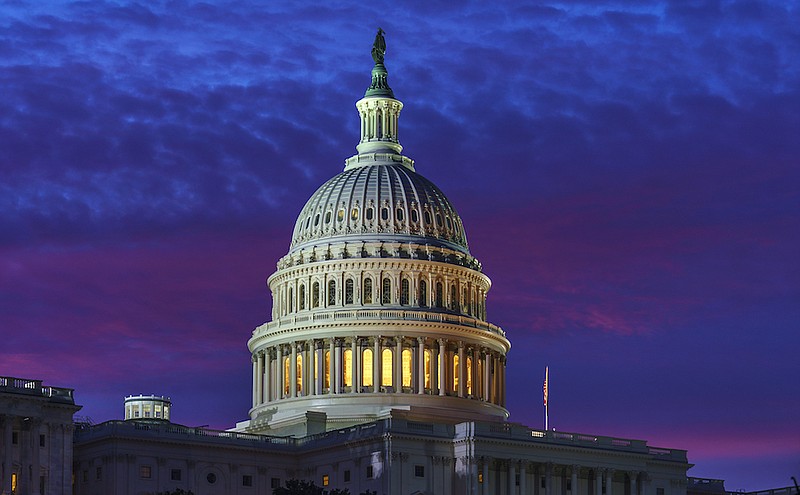Amazing what the fear of getting left behind in college athletics will do to members of the U.S. Congress who often seem determined to do nothing.
I write the above words after a bipartisan bill - and, yes, I assumed everything bipartisan had gone the way of cassette players - was reintroduced on Monday that would give college athletes the right to earn money through endorsements and sponsorship deals.
Co-sponsored by Representative Anthony Gonzalez - an Ohio Republican and former Ohio State football player - and Missouri Democrat Emanuel Cleaver, it's labeled the Student Athlete Level Playing Field Act and seeks to give student-athletes the right to be paid for their name, image and likeness, which is often referred to as NIL.
Somewhat remarkably, given how the NCAA had previously attempted to stall this issue into the 22nd century, college athletics' governing body actually released a statement supporting the bill.
Said the NCAA: "Their House bill will strengthen the college athlete experience and support the NCAA and its members to modernize name, image and likeness rules but not pay student-athletes or turn them into employees of their college or university."
And that's likely a good thing for all concerned, whether the athletes necessarily understand that or not.
But what this is really all about is fear, as in fear that as individual states such as Florida and Mississippi will begin to allow NIL agreements on July 1, states who've not yet passed such laws may find their universities left behind, though the NCAA is yet to approve such measures.
Exactly.
So Congress, which typically acts at the speed of a very old turtle for anything other than voting itself a pay raise, no doubt sees future votes lost or won depending on how its constituents view its attempts to keep the playing fields and courts level for Home State U., unless they can find a way to tilt it in those schools' favor.
If Florida and Mississippi are putting economic opportunities for college athletes first, woe be to Congressmen whose states are left behind. Especially since both those states call the Southeastern Conference home, which is never going to be second to anyone when it comes to recruiting advantages.
Or as Gonzalez noted on Monday: "We are facing a tight deadline with state laws taking effect just around the corner. The time for action on this issue is now. Student-athletes have long deserved the right to profit from their NIL. Our bill would grant this right, while also protecting the integrity of the college sports system."
When LSU and former University of Tennessee at Chattanooga basketball coach Will Wade is yet to be disciplined, if not terminated, for what the FBI taped him doing in almost assuredly offering money to someone connected to eventual Bayou Bengal point guard Javonte Smart; when Kansas is yet to be censored for the similar behavior caught on tape, injecting the word "integrity" into any sentence about college athletics is a crime unto itself.
And for the last time, at least in this column, these guys are paid already. They get a full-ride scholarship with perks a Phi Beta Kappa kid on the verge of curing cancer could only dream about. Plus, the financially disadvantaged all qualify for Pell Grants, which put several thousand dollars in their pockets.
Sure a Zion Williamson or Peyton Manning would deserve more, but they'll get far more in endorsements as soon as their college careers end than the pennies they'll receive on the dollar in NIL deals.
Beyond that, and college coaches all privately worry about this, what kind of envy and jealousy could wreck a team where some guys are making a lot more money than others? Who's to say offensive linemen decide not to block as hard for the star running back if he doesn't share some of his NIL money, since without their blocking he's tackled for losses instead of gains?
Then there's the out-of-pocket costs to, um, (wink-wink) make sure such deals are legitimate, rather than the thinly disguised under-the-table handshakes of the past.
"We'll have to hire another administrator to keep up with it," said UTC athletic director Mark Wharton earlier this month. "And at schools like us, that's a financial hardship."
We've quit worrying about responsible ways to erase financial hardships in this country. We just print more money we don't have, and in many cases don't need. And the financial hardships on all of us if the folks loaning us those trillions - China, anyone? - call in those notes could be catastrophic.
But, hey, it was fun while it lasted.
And maybe that's the way to look at this Congressional legislation. It allows the NCAA to keep its status quo on shamateurism. It allows college athletics' most gifted and marketable athletes to make as much or more money over the table as they've long received under the table.
But if this be college athletics' future, your humble scribe has but one request: Please never again tie any of this to integrity.
Contact Mark Wiedmer at mwiedmer@timesfreepress.com.
